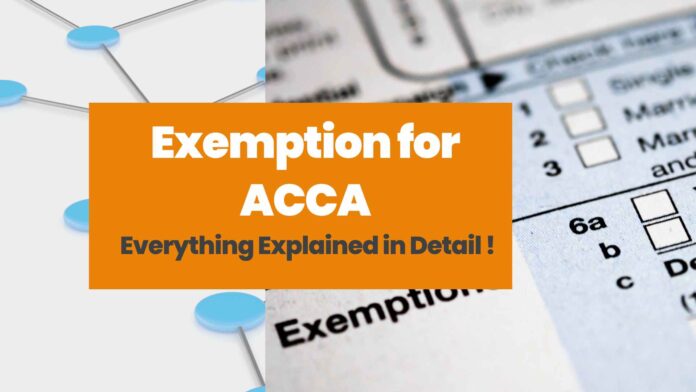Introduction
When it comes to academic qualifications in the finance industry, one of the most sought-after is the Association of Chartered Certified Accountants (ACCA). The exemption for ACCA is for certain types of qualifications, allowing individuals to enter or progress within the finance industry without having to obtain an ACCA qualification.
To provide an overview of exemption for ACCA, let’s start by looking at what ACAA and exemptions are. ACAA stands for the Academic and Corporate Recognition and Exemptions System, which is used by ACCA to assess qualifications from other providers. Each year, the system evaluates a range of qualifications that students have either studied before or are currently studying and can award additional points or exemptions towards their overall qualification.
For those who don’t have any prior experience in accounting but are interested in obtaining an ACCA qualification, there are two options they can take when applying for an exemption. The first option is to apply directly through ACCA by providing evidence of all relevant qualifications you hold, such as university degrees or professional certificates. The second option is to apply through a Registered Tuition provider, who will assess your suitability for an exemption on behalf of ACCA.
Eligibility Criteria for exemption for ACCA Exams
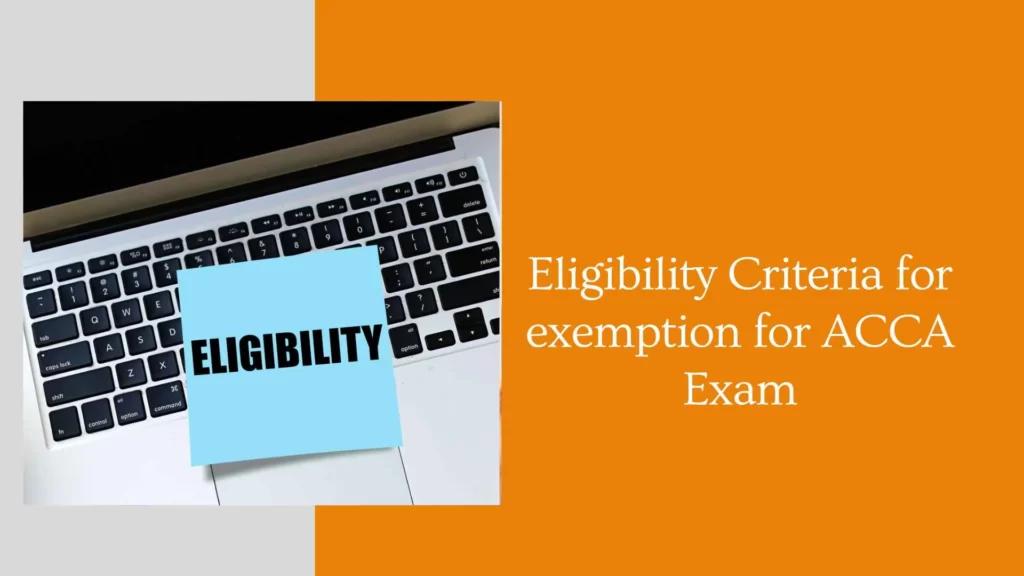
To be eligible for the exemption for ACCA, you must meet certain criteria. Let’s review the main points that determine the eligibility for exemption for ACCA and how to apply for them.
First of all, only recognized qualifications are taken into account when assessing eligibility. When determining if a qualification is eligible for an exemption, ACCA takes into account the institution awarding it, the content covered in the course and its equivalent status to an ACCA paper.
The assessment process also looks at factors such as your past experience and qualifications. If a candidate has relevant experience or qualifications that satisfy at least one paper of the syllabus (or its equivalent according to the agreed substitution rules), then they may be eligible for an exemption from that paper. Nonetheless, you will still have to provide proof of knowledge and understanding through either written evidence or by sitting an online test in some cases.
When applying for exemptions based on prior qualifications or experiences, applicants must take into account time limits as proof of competence must not date back further than 10 years ago from when they applied for the examination. Additionally, even if your prior qualification was taken 10 years ago, it has to refer to a syllabus that is updated with current content requirements as those change regularly.
Lastly, transfer credits are available too if a course includes more than one topic covered by two different papers listed in the syllabus on exemption requirements. In this case, applicants can receive credit points instead of having to sit both papers separately.
Have a look at the best investment banker courses
Benefits of Attaining an Exemption for ACCA
Attaining exemption for ACCA can offer a world of professional and financial rewards. This globally recognized qualification has been designed to provide individuals with the relevant technical knowledge, skills and confidence to help further their careers. Along with broadening career prospects, here are some of the key benefits that come with gaining exemption for ACCA:
Professional Recognition
The exemption for ACCA is an international benchmark of professional recognition. It is one of the highest levels of recognition in the accounting and finance sector, providing invaluable credibility and respect amongst peers.
Financial Rewards
By earning the exemption for ACCA, your expertise will be rewarded with higher salaries and expanded job opportunities – earning you more than other non-qualified finance professionals. You will also develop a deeper understanding of current tax systems and regulations, allowing you to identify potential savings for your company or clients.
Relevant Technical Knowledge
The exemption for ACCA provides a comprehensive overview of business performance criteria as well as accounting theories, principles and practices – all highly beneficial for employers looking for professionals who can think strategically about financial management. Also, by staying up to date with the latest technologies and developments in the field, you will be ready to take on any new challenges that arise in your day-to-day professional life.
Increased Job Security
It is widely accepted that those who hold exemption for ACCA have greater job security than their non-qualified counterparts due to their greater knowledge base and mastery of industry standards. The experience you gain from pursuing this qualification also helps demonstrate commitment and employability, two vital qualities sought after by recruiters when filling positions within the sector.
Broaden career prospects
The exemption for ACCA will broaden your potential career options, allowing you to take on roles requiring more skill and expertise than the standard entry-level position offers. With this higher level of competency comes improved employment opportunities, as employers will be more likely to show interest in professionals with recognized qualifications like an ACCA exemption. The acknowledgement of your skillset by this global body will also generate new opportunities for you across different companies and industries.
Visit the top PG Program In Financial Modelling
Marketable skillset development
Obtaining an ACCA exemption signifies that you have a comprehensive understanding of accounting theory and practice as well as excellent professional ethics, which are essential for succeeding in the world of finance and accounting. Having this designation on your resume will further improve your employability prospects as employers will recognize that you have benefitted from additional training and gained more practical experience than other applicants vying for the same role.
Not only does having an ACCA exemption showcase your competence to prospective employers, but it also provides global recognition of your qualifications. This recognition makes it easier for individuals looking to relocate or work overseas; employers outside their country of residence will be able to see their credentials quickly and acknowledge them as valid due to this backing from such a reputable institution.
Fees for Attaining an ACCA Exemption
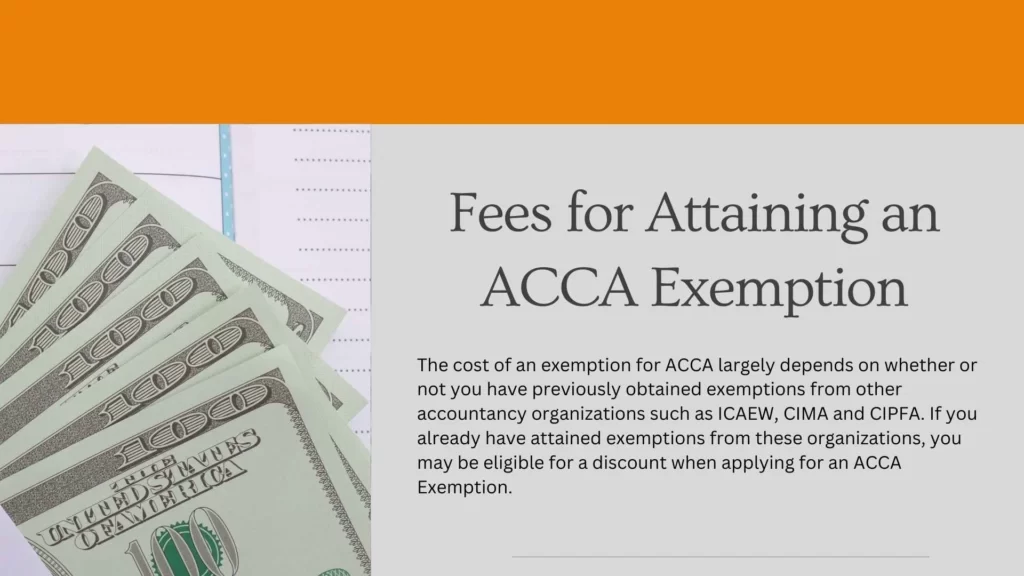
Pursuing an exemption for ACCA can be a great way to gain additional professional accreditation in bookkeeping and accounting. Understanding the associated fees is an important part of the process, so it’s important to be fully informed before taking this step.
The cost of an exemption for ACCA largely depends on whether or not you have previously obtained exemptions from other accountancy organizations such as ICAEW, CIMA and CIPFA. If you already have attained exemptions from these organizations, you may be eligible for a discount when applying for an ACCA Exemption. You should check with the relevant organization in order to confirm your eligibility for any discounts.
In terms of fees specifically related to the exemption for ACCA itself, all applications are subject to a registration fee of £37 (GBP) plus assessment fees for the subjects that you intend to seek exemption on. The fees vary depending on how many exemptions you are seeking, and they can range from £114 GBP per subject up to £294 GBP per subject – so it’s important to consider your goals carefully before making any decisions.
Students who qualify for an exemption for ACCA from the Knowledge and Skill level tests for the ACCA must still pay for each exemption they request. You can claim an exemption from the predetermined fee that the ACCA levies for each paper. The exemption price for Applied Knowledge tests is 86 GBP per paper in 2022, compared to 114 GBP for Applied Skill exams. The ACCA sets these fees, which could change in the future.
Finally, if you fail any part of your assessment or if your assessment application is refused by the ACCA then there may also be a fee payable; this fee will vary depending on the circumstances surrounding your application and will need to be confirmed prior to submitting your application.
By understanding the different fees associated with attaining an ACCA Exemption and researching potential discounts that may be available based on previous qualifications or experience, you will be able to make an informed decision when choosing whether or not to pursue this type of qualification.
Are there fee waivers for exemption for ACCA Exams
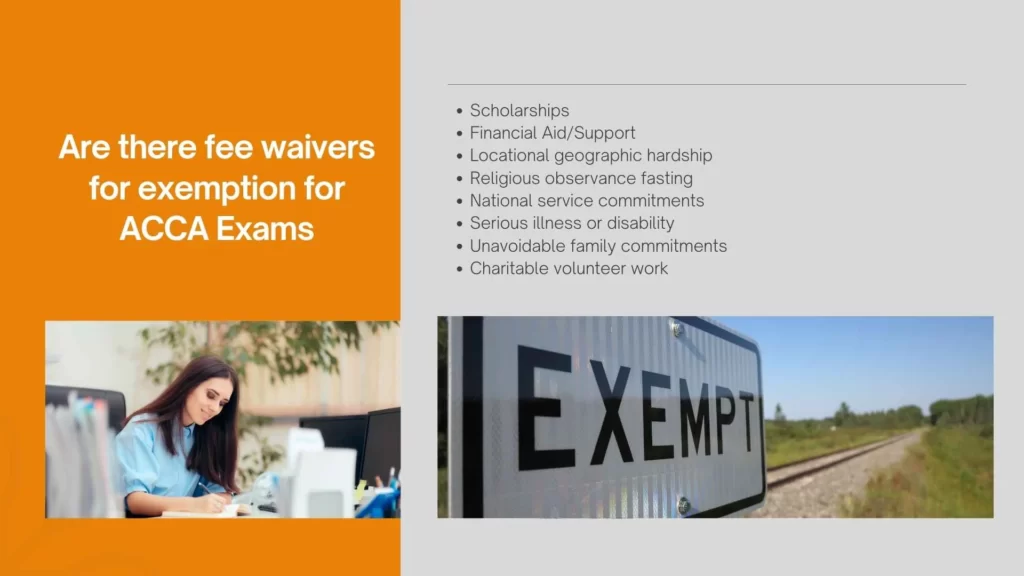
Firstly, it’s important to note that not all fees associated with gaining ACCA membership are eligible for a waiver. The fees waived are related specifically to exam-related costs such as registration, tuition or subscription fees. That said, there are multiple categories of exemptions that may be eligible for fee waivers. You should review this list with your institute for confirmation:
- Scholarships
- Financial Aid/Support
- Locational geographic hardship
- Religious observance fasting
- National service commitments
- Serious illness or disability
- Unavoidable family commitments
- Charitable volunteer work
It’s worth noting that the exemption for ACCA is granted on a case-by-case basis; you’ll need to contact your institute directly to discuss whether any circumstances apply to your situation. Each institute has its own policy regarding fee waivers and will make a decision based on its criteria (which should be clearly stated). If accepted, they may waive some or all of the associated exam costs.
Ultimately, institutes play an important role in the waiver process when it comes to exemption for ACCA examinations. They have adopted strict eligibility criteria in order to protect both parties; institutes must ensure they are not taken advantage of while also providing legitimate fee waivers as needed when warranted by a student’s circumstances.
Know the best Investment Banking course with placement guarantee
Exemptions for B.Com and M.Com Qualified Students
The Association of Chartered Certified Accountants (ACCA) grants exemption for ACCA exams from some of their students who have already completed a degree or postgraduate diploma in accounting, finance or business-related areas. Nine papers are excluded from these qualifications, meaning that if you have a B.Com or M.Com qualification these will be automatically exempted from the exam process and you can immediately enter the professional stage of your career with great confidence knowing that your advanced skillset has been recognized.
ACCA offers exemptions in seven major paper categories including Strategic Professional, Fundamentals, Applied Knowledge and Applied Skills as well as three further specialist modules; Financial Management, Taxation & Advanced Taxation and Performance Management. To apply for RPL exemption, applicants must first pass an Eligibility Test which is conducted online by the ACCA Global Exams Department. Once they have passed this test they can then submit the necessary documents to prove their eligibility for each individual paper within those categories mentioned above. The exemptions for ACCA papers for B.com and M.com students are
- F1 – Business and Technology
- F2 – Management Accounting
- F3 – Financial Accounting
- F4 – Corporate and Business Law
With so many options available it can be difficult to stay on top of what exemptions are applicable for whom, but there is no need to worry as ACCA regularly updates its website with comprehensive details about every paper’s eligibility criteria and whether or not it is exemptible from RPL applications through B.Com and M.Com qualifications. With clear guidance provided at every step of the way, it’s never been easier for qualified students to jumpstart their new careers.
Exemptions for BBA Qualified Students
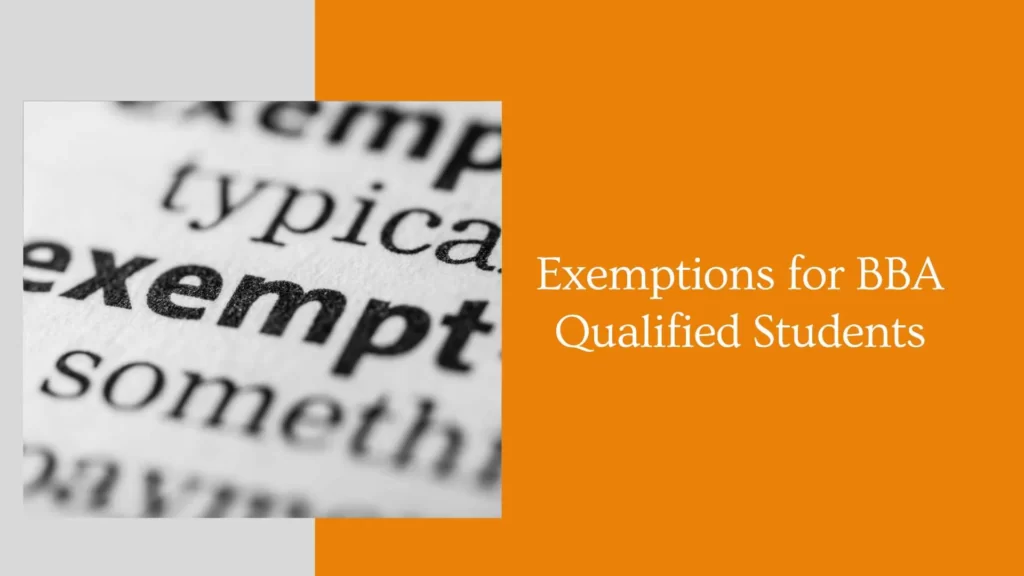
Are you a BBA-qualified student looking for an exemption from the ACCA (Association of Chartered Certified Accountants) exams? If yes, then you’ll be pleased to know that there are several exemption for ACCA exams for BBA-qualified students. Depending on your qualifications, you may be able to get exemptions from up to nine papers.
For instance, if you have a BBA degree with a major in accounting, or a professional accounting qualification, then you will be eligible for the maximum amount of exemptions from the ACCA exams. In this case, you could receive exemptions from up to nine papers including Financial Reporting (FR), Business Law (LW), Corporate and Business Law (CL), Audit and Assurance (AP), Management Accounting (MA) and Financial Management (FM).
For those without any professional accounting experience but with a BBA degree in economics or finance, there are more limited exemptions available. You can get an exemption from up to four papers including two Fundamental Level papers and two Professional Level papers. These could include Financial Reporting (FR), Business Law (LW), Corporate and Business Law (CL) and any other Practical Experience Requirement paper.
However, it is important to keep in mind that the number of exemptions can vary depending on the specific university or college you received your BBA degree. Some universities may offer additional exemptions if they have agreements with ACCA. Therefore, it is best to check with your institution directly before applying for any qualifications or certifications with ACCA.
ACCA Exemptions for CA IPCC Qualified Students
Are you a CA IPCC-qualified student looking to pursue a career in ACCA? You’ll be pleased to know that the Association of Chartered Certified Accountants (ACCA) offers some exemptions for CA IPCC qualified students. This means you don’t have to start from scratch and can make use of your existing qualifications while pursuing the ACCA.
The exemption for ACCA Policy allows students with relevant qualifications including those with the Chartered Accountant (CA) and Indian Professional Certificate of Competence (IPCC) qualifications to obtain exemptions from certain papers taken in the course of their ACCA studies.
Under this policy, those with a qualification equivalent, to or higher than, the CA IPCC are eligible for up to 9 exemptions from their ACCA course. These exemptions are divided into nine main areas: strategy and innovation, financial reporting, performance management, taxation, audit and assurance, financial management, business analysis, business law and ethics and corporate governance.
It is important to note that each exemption for ACCA paper requested is subject to an administrative fee which must be paid in full before any application can be considered by the relevant accreditation team. Additionally, any exemption will only be granted on the basis of evidence submitted regarding a student’s academic background so any documentation should be carefully prepared in keeping with this requirement.
It is also advisable to thoroughly research all potential exemptions before opting for them as they may significantly influence the overall duration of your studies and future career prospects.
So if you’re a CA IPCC qualified student considering doing your ACCA qualification then it’s worth understanding the various options you have for obtaining an exemption for ACCA.
ACCA Exemptions for Qualified CAs
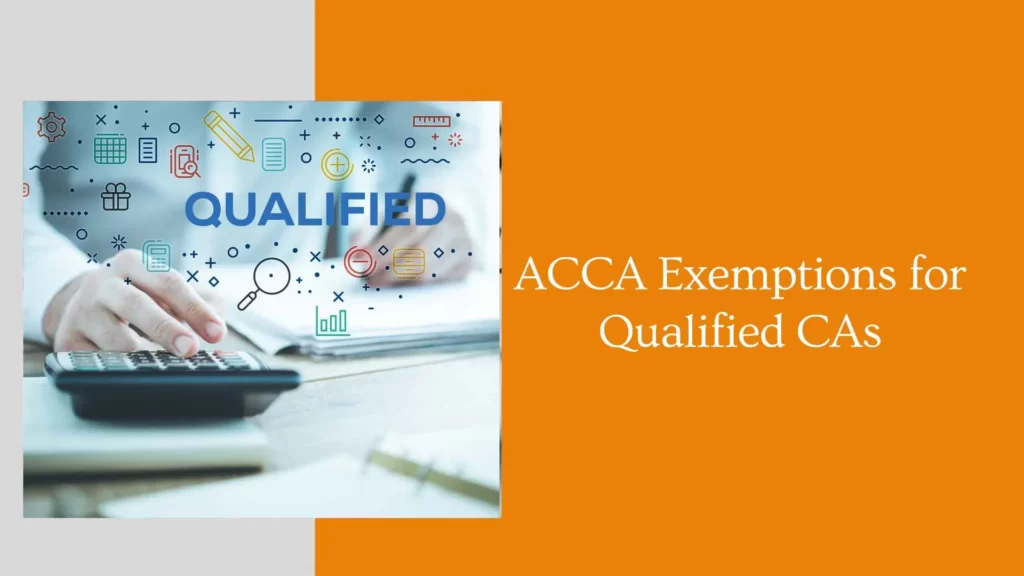
In general, ACCA offers a range of different qualifications for individuals with different backgrounds. Depending on your existing qualifications, you may be able to claim up to 9 exemptions from the entire ACCA syllabus. This means that if you are a qualified CA and are looking at taking the ACCA qualifications, you could have 9 fewer papers to sit for in the examination process.
The number of exemption for ACCA exams can be claimed depending on your specific qualifications and experience in the accounting field. Exemptions are available for four professional-level papers, including F7 Financial Reporting, F8 Audit and Assurance, F9 Financial Management and P1 Professional Accountant (all four papers must be passed). Additionally, another five papers at the Knowledge Level can also be exempted if they meet certain criteria and are part of your CA qualification.
The following exams are available: F1 Accountant in Business, F2 Management Accounting, F3 Financial Accounting, F4 Corporate and Business Law, and F5 Performance Management. In order to apply for an exemption for ACCA exams as a qualified CA, there are several steps that must be taken:
First, contact your local ACCA office for further information about eligibility criteria and exemption application processes. Make sure you have all relevant documents such as certifications ready before submitting your application form. Once all documents have been received by ACCA they will assess each application individually.
Also, know how to become investment banker in india
Who does not Qualify for exemption for ACCA exams
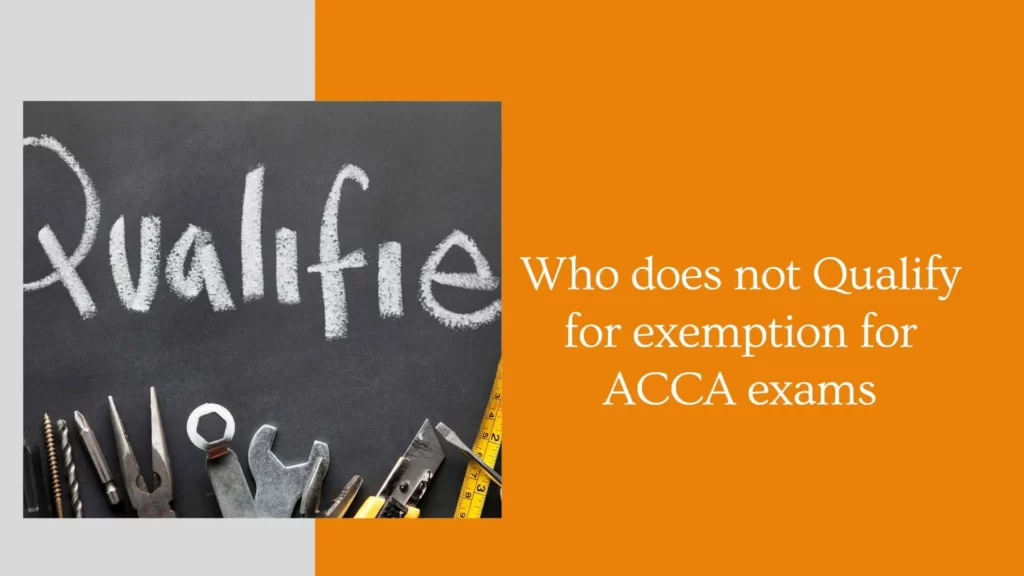
Before you begin to apply for the necessary qualifications, it is important to understand who does not qualify for exemption from ACCA. Knowing who does not qualify is as important as knowing who does qualify and will help you have realistic expectations when starting your journey towards getting qualified.
First and foremost, individuals who are in the process of completing their secondary school studies cannot be exempted from ACCA. This means that individuals under 18 years of age cannot apply for an exemption. In addition, having already completed a degree in accounting or finance is not enough to qualify one for exemption. Exemption from ACCA can only be granted to those who have a recognised accounting qualification or professional experience that meets the required set of standards set by the ACCA body.
Those with professional experience in accounting but who do not have a formal qualification also may not qualify for exemption if they do not meet the criteria set by the ACCA body. For instance, those employed in straightforward accounting roles such as bookkeeping or data entry positions may not necessarily meet the criteria for exemption from ACCA.
In order to obtain an exemption from ACCA, individuals must demonstrate relevant work experience and knowledge within a wide range of areas such as auditing, taxation, management leadership and financial management in addition to technical skills such as computer literacy and numeracy skills [reference]. Documentation showing proof of these experiences will need to be provided when applying for an exemption.
Finally, prior study at another international institution may not automatically result in an individual gaining exemption from ACCA depending on whether it meets global standards established by ACCA bodies across different countries [reference]. Those wishing to use prior
Conclusion
In order to successfully apply for exemption for ACCA you will need several documents including your academic transcripts, proof of ID and evidence that your qualifications meet their entry requirements. It’s also important to note that certain universities may be eligible for full or partial exemption hours depending on the type and content of courses studied. We recommend talking directly with your previous university or college as they may provide expert advice on whether any prior knowledge can be counted towards your final qualification hours.
Frequently Asked Questions
An Exemption for ACCA is when you don’t have to take certain exams in the ACCA Qualification or Foundations in Accountancy awards. These exemptions are based on your existing qualifications and will place you at the appropriate level for your skills and knowledge.
If you have a US CPA, you can get 8 Exemption for ACCA. If you have a CMA from India and 5 years of relevant work experience, you can get 9 Exemption for ACCA. If your CMA is from the USA, you can get 3 Exemption for ACCA .
Students who have a B.Com or M.Com qualification are exempt from the ACCA Knowledge level courses (F1 to F3) and the ACCA Skill level course (F4).
You must pay a fee for each exemption you request. These fees help us assess and approve a worldwide network of professional and academic organizations and their awards, so that students can begin their qualifications at the appropriate level.
ACCA is a globally recognised qualification, so it is generally considered higher than CA. CA focuses on Indian accounting, finance and taxation systems, which makes it a great option for those looking to work in India, but not suitable for those who want to work overseas.
Indian Chartered Accountants can get up to 9 exemptions out of the 13 papers that make up the ACCA qualification (from F1 to F9). This means you only need to pass 4 papers in order to start your professional ACCA qualification.
CMA is significantly harder to pass than ACCA. This can be seen from the pass percentages: CMA’s pass rate is roughly 20%, whereas ACCA’s is 40-50%.
You need at least three years to get ACCA certification.
You can be exempted from all nine papers at the Applied Knowledge and Applied Skills levels
The average cost of an ACCA course, including tuition fees, is about Rs 3,60,000*. We offer student loans to help with the fees; for more information please speak to one of our counsellors.




